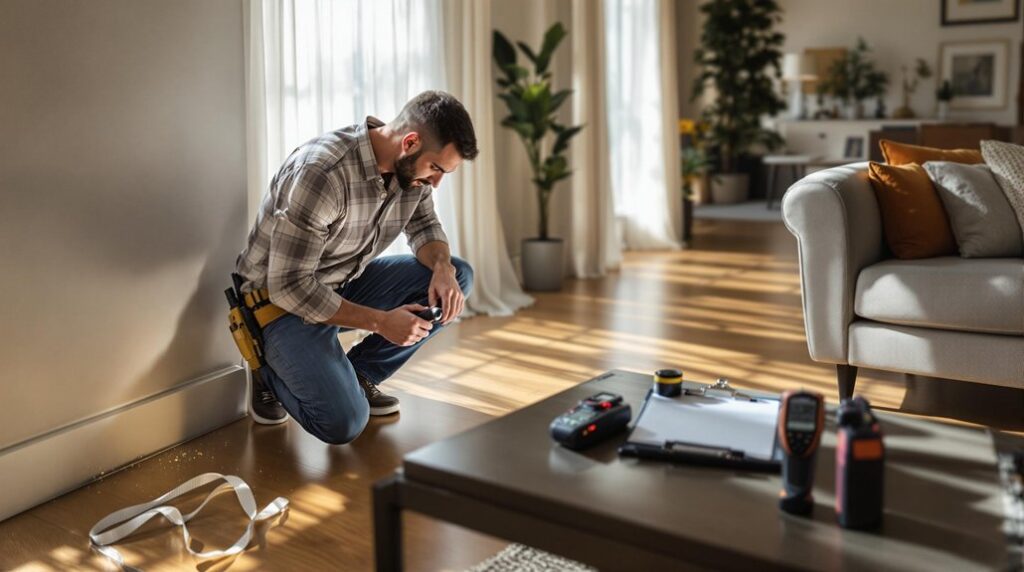Local home inspector services are essential for evaluating a property's condition, focusing on key areas like roofs, foundations, electrical systems, and plumbing. By hiring a local inspector, you benefit from their familiarity with local building codes and housing markets, ensuring a thorough evaluation. A typical inspection lasts two to three hours, where inspectors identify potential issues that could affect safety and value. Understanding their role can help you make informed decisions throughout the buying process. Continue on to uncover essential tips for choosing the right inspector.
The Role of Home Inspectors in Real Estate Transactions
Home inspectors play an essential role in real estate transactions, as they provide an objective assessment of a property's condition before a sale is finalized. Their evaluations help you identify potential issues that could affect the property's value or safety. By conducting a thorough inspection, they examine various aspects, including the roof, plumbing, electrical systems, and foundation. This detailed analysis enables you to make informed decisions, whether you're buying or selling. Furthermore, home inspectors often provide a detailed report, outlining their findings and recommendations, which can serve as a negotiation tool during the transaction process. Ultimately, their expertise helps guarantee that you understand the property's true condition, minimizing the risk of unexpected expenses after the sale.
Common Areas of Focus During Home Inspections
During a home inspection, several key areas receive particular attention, each contributing to a thorough evaluation of the property's condition. Inspectors focus on the roof, checking for damage, leaks, or wear that could indicate future issues. They examine the foundation for cracks or signs of settling, which can affect structural integrity. Electrical systems are scrutinized to guarantee safety and compliance with codes, including the condition of wiring and outlets. Plumbing is also evaluated, looking for leaks, water pressure, and drainage efficiency. Additionally, HVAC systems are assessed for functionality and maintenance needs. Finally, the overall condition of windows, doors, and insulation is checked to confirm energy efficiency and security. Each of these areas plays a significant role in evaluating the property's overall health.
Benefits of Hiring Local Home Inspectors
Hiring local home inspectors offers several distinct advantages that can greatly enhance your property evaluation experience. Local inspectors possess intimate knowledge of the area's housing market, building codes, and environmental concerns, which can lead to more accurate assessments. Their proximity often means quicker response times for scheduling inspections, ensuring you receive timely information. In addition, local inspectors tend to have established relationships with contractors and service providers, which can be beneficial if repairs are needed.
| Advantage | Description | Impact |
|---|---|---|
| Local Knowledge | Understanding of local building codes | More accurate evaluations |
| Quick Response | Faster scheduling and inspection times | Timely information |
| Established Contacts | Relationships with local contractors | Easier repair referrals |
| Community Reputation | Familiarity with local inspector's reliability | Increased trust |
| Cost-Effectiveness | Often competitive pricing compared to nationals | Better budget management |
How to Choose the Right Home Inspector
How can you guarantee that you choose the right home inspector for your property? Selecting a qualified home inspector is essential for ensuring your investment is sound. Here's a straightforward approach to guide your decision:
- Check Qualifications: Look for inspectors with relevant certifications and licenses in your state. Their training and experience can greatly influence the inspection quality.
- Read Reviews: Go through online reviews and testimonials from previous clients. Feedback can provide insights into their reliability and thoroughness.
- Ask for Samples: Request a sample report to evaluate their inspection style. A detailed and clear report indicates professionalism and attention to detail.
What to Expect During a Home Inspection
As you prepare for a home inspection, it's important to understand what to expect, so you can make the most of the process. A typical inspection lasts about two to three hours, during which the inspector will evaluate major components of the home. They'll check the roof, plumbing, electrical systems, and foundation, looking for any signs of damage or needed repairs.
| Area Inspected | Common Issues Found | Importance |
|---|---|---|
| Roof | Missing shingles, leaks | Protects from weather damage |
| Plumbing | Leaks, outdated fixtures | Essential for functionality |
| Electrical Systems | Outdated wiring, non-compliance | Safety and efficiency |
| Foundation | Cracks, settling issues | Structural integrity |
Understanding these aspects will help you engage with the inspector and address any concerns effectively.
